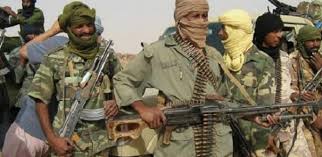
EU-funded Report Confirms Polisario’s Involvement in Terrorist Acts
 A new report, commissioned and funded by the European Union, has pointed out that the Algeria-backed Polisario front, is involved in the terrorist activities and arms trafficking that plague the Sahel-Sahara region.
A new report, commissioned and funded by the European Union, has pointed out that the Algeria-backed Polisario front, is involved in the terrorist activities and arms trafficking that plague the Sahel-Sahara region.
The Polisario’s conversion to terrorism has once again been confirmed by a damning report, elaborated by “Project Safte”, an international research project that investigates the access of terrorists to the illicit firearms trade.
The report, “Illegal Markets and the Acquisition of Firearms by Terrorist Networks in Europe”, highlights the documented connection between the separatist front and the jihadist groups swarming in the Sahel-Sahara powder keg, notably the MUJAO (Movement for Unity and Jihad in West Africa) and Ansar Dine (a creation of the Algerian intelligence services/DRS) based in the city of Gao, in northern Mali.
Long before the release of this new report, connection was established between the Polisario Front and Algerian terrorist Mokhtar Belmokhtar, a native of Annaba and a regular visitor to the corridors of the Algerian DRS. Links were also established between the separatist front and the terrorist Adnane Abu-Walid Sahrawi, a former soldier of the so-called “Sahrawi People’s Liberation Army”. Also, Mauritania had seized arms and ammunition smuggled from Tindouf, the Polisario’s headquarters in Algeria.
Project Safte explained that the links between the Polisario and terrorist groups were facilitated by the situation in Libya, and the inability of the central powers of some countries in the region to monitor their vast territories and their porous borders.
Taking advantage of the anarchy prevailing in Libya, where Polisario militias had fought alongside the army of the former dictator Muammar Gaddafi, with the blessing of the Algerian regime, the separatist front could divert large quantities of weapons and resell them, via Mauritania, to terrorist groups swarming in the Sahel-Sahara region.
“The availability and circulation of weapons on the black market in the region has proliferated significantly after the fall of the Kaddhafi regime and the conflicts that followed in that country,” notes Project Safte, noting that the Polisario Front has benefited from this situation and now has a “surplus of armaments”.
Yet, the Polisario’s arsenal is not made up of Libyan weapons only. The bulk of this arsenal is provided by Algeria.
At present, the Polisario tries to sell its relatively large arsenal on the black market, a highly lucrative activity, stated the EU report, warning that “the Polisario now has enough weapons to sell and supply the regional market.”
Project Safte experts sounded the alarm: in the absence of a solution to the Sahara issue, “the area is not invulnerable to arms smuggling and trafficking” and “some of these weapons will also end up in the European Union”.
The report recalled in this connection that in 2015, Europol publicly declared for the first time that firearms from Libya, Syria and Mali were available on the European black market and that these countries could become major suppliers of illegal firearms to the EU.
Given the lucrative revenues of this trafficking, one can understand why the Polisario and some Algerian Generals are in no hurry to settle the artificial Sahara conflict, kindled by Algeria for over forty years.
